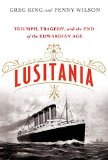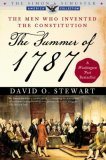Summary | Excerpt | Reading Guide | Reviews | Read-Alikes | Genres & Themes | Author Bio

Six Months That Changed The World
by Margaret MacMillan'Without question, Margaret MacMillan's Paris 1919 is the most honest and engaging history ever written about those fateful months after World War I when the maps of Europe were redrawn. Brimming with lucid analysis, elegant character sketches, and geopolitical pathos, it is essential reading.'
Between January and July 1919, after "the war to end all wars," men and women from around the world converged on Paris to shape the peace. Center stage, for the first time in history, was an American president, Woodrow Wilson, who with his Fourteen Points seemed to promise to so many people the fulfillment of their dreams. Stern, intransigent, impatient when it came to security concerns and wildly idealistic in his dream of a League of Nations that would resolve all future conflict peacefully, Wilson is only one of the larger-than-life characters who fill the pages of this extraordinary book. David Lloyd George, the gregarious and wily British prime minister, brought Winston Churchill and John Maynard Keynes. Lawrence of Arabia joined the Arab delegation. Ho Chi Minh, a kitchen assistant at the Ritz, submitted a petition for an independent Vietnam.
For six months, Paris was effectively the center of the world as the peacemakers carved up bankrupt empires and created new countries. This book brings to life the personalities, ideals, and prejudices of the men who shaped the settlement. They pushed Russia to the sidelines, alienated China, and dismissed the Arabs. They struggled with the problems of Kosovo, of the Kurds, and of a homeland for the Jews.
The peacemakers, so it has been said, failed dismally; above all they failed to prevent another war. Margaret MacMillan argues that they have unfairly been made the scapegoats for the mistakes of those who came later. She refutes received ideas about the path from Versailles to World War II and debunks the widely accepted notion that reparations imposed on the Germans were in large part responsible for the Second World War.
A landmark work of narrative history, Paris 1919 is the first full-scale treatment of the Peace Conference in more than twenty-five years. It offers a scintillating view of those dramatic and fateful days when much of the modern world was sketched out, when countries were created--Iraq, Yugoslavia, Israel--whose troubles haunt us still.
Winner of the Samuel Johnson Prize, the PEN Hessell Tiltman Prize and the Duff Cooper Prize
 Blanche Wiesen Cook, author of Eleanor Roosevelt
Margaret MacMillan's compelling portrait of the heroes and rascals of Versailles, with all their complex and contradictory human and political foibles, breathes life into the most urgent issues still before us. This brilliant and dramatic book rekindles hope in the grand defining themes that emerged as World War I ended economic justice, human rights, and a league to ensure international amity.
Blanche Wiesen Cook, author of Eleanor Roosevelt
Margaret MacMillan's compelling portrait of the heroes and rascals of Versailles, with all their complex and contradictory human and political foibles, breathes life into the most urgent issues still before us. This brilliant and dramatic book rekindles hope in the grand defining themes that emerged as World War I ended economic justice, human rights, and a league to ensure international amity. Douglas Brinkley, director of the Eisenhower Center
Without question, Margaret MacMillan's Paris 1919 is the most honest and engaging history ever written about those fateful months after World War I when the maps of Europe were redrawn. Brimming with lucid analysis, elegant character sketches, and geopolitical pathos, Paris 1919 is essential reading--the perfect follow-up to Barbara Tuchman's magisterial Guns of August.
Douglas Brinkley, director of the Eisenhower Center
Without question, Margaret MacMillan's Paris 1919 is the most honest and engaging history ever written about those fateful months after World War I when the maps of Europe were redrawn. Brimming with lucid analysis, elegant character sketches, and geopolitical pathos, Paris 1919 is essential reading--the perfect follow-up to Barbara Tuchman's magisterial Guns of August. Roy Jenkins, author of Churchill
Compelling . . . exactly the sort of book I most like written with pace and flavored with impudence based on solid scholarship; illuminating tangled subjects with irreverent pen portraits of the individuals concerned; and with a brilliant eye for quotations.
Roy Jenkins, author of Churchill
Compelling . . . exactly the sort of book I most like written with pace and flavored with impudence based on solid scholarship; illuminating tangled subjects with irreverent pen portraits of the individuals concerned; and with a brilliant eye for quotations.
If you liked Paris 1919, try these:

by Greg King, Penny Wilson
Published 2016
On the 100th Anniversary of its sinking, King and Wilson tell the story of the Lusitania's glamorous passengers and the torpedo that ended an era and prompted the US entry into World War I.

by David O. Stewart
Published 2008
The successful creation of the Constitution is a suspense story. The Summer of 1787 takes us into the sweltering room in which delegates struggled for four months to produce the flawed but enduring document that would define the nation -- then and now.
There is no worse robber than a bad book.
Click Here to find out who said this, as well as discovering other famous literary quotes!